Mary Anne Yarde's Blog: The Coffee Pot Book Club , page 225
May 17, 2016
Book Review - Jasper Book Two Of The Tudor Trilogy @tonyriches
Only those who roll the dice could ever hope to win.
Jasper - Book Two Of The Tudor TrilogyTony Riches

'Without the heroic Jasper Tudor there could have been no Tudor dynasty.' Terry Breverton, author, historian and Television Presenter.
'Jasper Tudor was the greatest survivor of the Wars of the Roses. Whilst almost all his contemporaries suffered often brutal and bloody deaths, Jasper persevered against all the odds. That's not to say it was easy, as you will discover...' Nathen Amin, Author of Tudor Wales.
Following the best-selling historical fiction novel OWEN – Book One of The Tudor Trilogy , this is the incredible story, based on actual events, of Owen’s son Jasper Tudor, who changes the history of England forever.
England 1461: The young King Edward of York takes the country by force from King Henry VI of Lancaster. Sir Jasper Tudor, Earl of Pembroke, flees the massacre of his Welsh army at the Battle of Mortimer’s Cross and plans a rebellion to return his half-brother King Henry to the throne.
When King Henry is imprisoned by Edward in the Tower of London and murdered, Jasper escapes to Brittany with his young nephew, Henry Tudor. After the sudden death of King Edward and the mysterious disappearance of his sons, a new king, Edward’s brother Richard III takes the English Throne. With nothing but his wits and charm, Jasper sees his chance to make young Henry Tudor king with a daring and reckless invasion of England.
Set in the often brutal world of fifteenth century England, Wales, Scotland, France, Burgundy and Brittany, during the Wars of the Roses, this fast-paced story is one of courage and adventure, love and belief in the destiny of the Tudors.
What did I think of the book?
With his father, Owen Tudor, cruelly executed at the hands of York and his wealth and title stolen from him, Jasper Tudor must use all his intelligence and knightly skills to stay alive. But he is also a man of unassailable principles and he will do everything in his power to see his half-brother, King Henry VI, reclaim his rightful thrown from the York pretender.
Set in the backdrop of The War of the Roses, Jasper - Book Two of The Tudor Trilogy, tells the story of Jasper Tudor, the man who despite the odds stacked against him, never gave up and fought alongside his nephew on that fateful day at Bosworth against King Richard III army and, despite the odds, won. Ending the Plantagenet’s long reign in England forever and bringing peace, at last, to a country that had been bitterly divided by civil war.
The historical details and the account of Jasper Tudor's life, in this book, was staggering. Riches brings the 15th Century back to life, and his portray of Jasper was so beautifully executed that it felt as if Jasper Tudor had written this book and was telling his story himself. Riches brought him back to life.
The story itself is fast-paced and the years of war and exile flew by as quickly as I turned the pages. The story was so compelling that I had a hard time putting this book down. And when I had finished, I had to sit quietly for a moment, digesting all that I had seen between the pages of this book. This story of Jasper will stay with me for a long time.
Tony Riches is, without a doubt, one of my favourite historical fiction authors. He is not only a skilled story-teller, but he makes you care, not only for the protagonists but for everyone else as well. His portrayal of young Henry, first as a child, and then as a young man was very believable. As was his portrayal of Richard Neville, 16th Earl of Warwick (The King Maker) and Margaret Beaufort.
Sometimes in these sort of accounts you can get a little lost in the detail, but not so in this case. An awful lot happens in this book, but Riches is your personal tour guide and makes the journey very comfortable and enjoyable.
If you are looking for quality fiction about the Tudor dynasty and the War of The Roses, then this is the book for you. It is certainly a book I will come back to again.
I Highly Recommend.
Where can I purchase a copy of this book?Amazon USAmazon UK
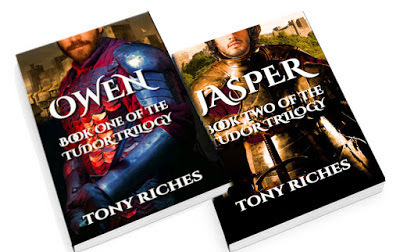
About the author
 Tony Riches is a full time author of best-selling fiction and non-fiction books. He lives by the sea in Pembrokeshire, West Wales with his wife and enjoys sea and river kayaking in his spare time.
Tony Riches is a full time author of best-selling fiction and non-fiction books. He lives by the sea in Pembrokeshire, West Wales with his wife and enjoys sea and river kayaking in his spare time. For more information about Tony’s other books please visit his popular blog, The Writing Desk and his Wordpress website and find him on Facebook and Twitter @tonyriches.
Published on May 17, 2016 00:00
May 16, 2016
Arthurian Legend - Roche Rock
A little while ago I blogged about Sir Tristan and his ill-fated love with a beautiful Irish woman called Iseult. Their story is set in Cornwall – in the far South West of Britain. If you missed the post, or you want a quick re-cap about their doomed love affair then you can find it here.
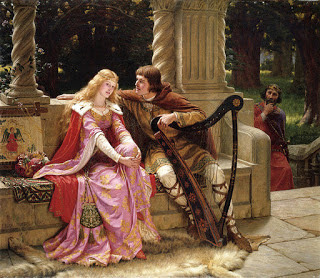
I love this picture by Edmund Blair Leighton (1853-1922) - take note of King Mark walking up the staircase.
 In the middle of Cornwall sits the parish of Roach. The village is named after a granite outcrop that can be found on the east side of the village. The name Roche comes from the Norman-French word for Rock. So I guess Roche Rock – which I am going to explore today - actually means Rock Rock!
In the middle of Cornwall sits the parish of Roach. The village is named after a granite outcrop that can be found on the east side of the village. The name Roche comes from the Norman-French word for Rock. So I guess Roche Rock – which I am going to explore today - actually means Rock Rock!Roche Rock is of great interest to geologists as well as those who seek the land in which Arthurian Legend is set in. For the geologists, Roche Rock is :
“…a fine example of quartz shorl; a fully tourmalinised granite, with black tourmaline crystals.” Wikipedia
(I know...I have no idea what that means either!)
For seekers of the legend, it has connections with Tristan and Iseult.
(Phew! - back to familair terittory!)
It is thought that Roche Rock was the site of Ogrin’s Chaple. Orgin was a hermit who in, The Romance of Tristan and Iseult, shows the two young lovers the error of their ways – adultery is sinful and they must repent...
“Friends,” he cried, “see how Love drives you still to further wretchedness. Will you not do penance at last for your madness?”
“Lord Ogrin,” said Tristan, “hear us. Help us to offer peace to the King, and I will yield him the Queen, and will myself go far away into Brittany or the Lowlands, and if some day the King suffer me, I will return and serve as I should.”
And at the hermit’s feet Iseult said in her turn:“Nor will I live longer so, for though I will not say one word of penance for my love, which is there and remains forever, yet from now on I will be separate from him.”
Then the hermit wept and praised God and cried: “High King, I praise Thy Name, for that Thou hast let me live so long as to give aid to these!”
There is a later version of the tale – when isn’t there? This time Tristan is at the mercy of King Mark. He has been imprisoned and only by some daring athletic acrobatics - which sees Tristan jumping out of his window and on to some perilous rocks - does he escape with his life.
I have found this wonderful video on YouTube by Alan Lang, which shows your the magesty of Roche Rock. Take a look.
If nothing else Roche Rock is breathtakingly beautiful and who knows – maybe the young lovers did find refuge there.
Published on May 16, 2016 00:00
May 15, 2016
Book Spotlight - The Pitchfork Rebellion #YA #HisFic
✶✶✶✶✶ When the devil wanted to destroy the world he would do so with fire. Alden du Lac knew this for a fact, because the devil had come to Cerniw.
When the devil wanted to destroy the world he would do so with fire. Alden du Lac knew this for a fact, because the devil had come to Cerniw.
Alden may have driven the man who tortured him from his lands, but he can do nothing to drive him from his dreams.
Alden has become bitter, angry and unrecognizable to those who love him. The only person whom could possible bring him back from the brink is his younger brother Merton. But even Merton is at a loss as to what to do.
As Alden seemingly wars with himself, there is a new threat to the kingdom. A threat that nobody foresaw, or could have possibly predicted… ✶ ✶✶ ✶ ✶
"Ms. Yarde continues her classic historical sequel right where the original story ended. Ms. Yarde continues to intrigue her avid fans with the trials and tribulations of Alden and Annis in the midst of death and destruction. Her beautiful love story between the main characters continues in spite of personal doubt, guilt and who can be trusted in the kingdom that is hopelessly divided. Like book one, I was hooked from page one, and I could not wait to see how the events would unfold."
Amazon Reviewer

Book Extract “Have you seen how the people react to Annis? How they react to me?” Alden continued, shouting at the top of his voice.
The horse snorted in fear and backed up a few steps. “It’s all right,” Merton said gently. The horse’s ears went forward as Merton spoke. Merton knew not whether he was speaking to the horse or his brother. Both were frightened, he realised.
“I have witnessed it,” Merton answered, his voice steady. “And I have defended her. You need to give them time to get used to the idea and to realise that she is nothing like her father.”
“I don’t want to give them time. I bled for them.” He turned abruptly away and ran his fingers roughly through his dark hair. “I bled for them,” he said again, only this time his words were softer, and the hurt that Alden had tried so hard to conceal rang out in his words. “I would have died for them and how do they repay me? They spit at my wife and they call me a traitor.” Alden shook his head and laughed without any humour. “I am going to abdicate. My mind is made up.”
“And who is supposed to take your place on the throne?” Merton questioned, his voice wobbling a little, for he knew if he said the wrong thing there would be no going back from this. This was his last chance, he realised. If he did not bring his brother back now then he would be lost to him forever. “Me?” he asked when Alden simply looked at him. “Can you even begin to imagine the mess I would make of that?” Pick up your copy of The Pitchfork RebellionOnly 0.99 on Amazon.Amazon USAmazon UK About the author Born in Bath, England, Mary Anne Yarde grew up in the southwest of England, surrounded and influenced by centuries of history and mythology. Glastonbury--the fabled Isle of Avalon--was a mere fifteen-minute drive from her home, and tales of King Arthur and his knights were part of her childhood.
Born in Bath, England, Mary Anne Yarde grew up in the southwest of England, surrounded and influenced by centuries of history and mythology. Glastonbury--the fabled Isle of Avalon--was a mere fifteen-minute drive from her home, and tales of King Arthur and his knights were part of her childhood.
At nineteen, Yarde married her childhood sweetheart and began a bachelor of arts in history at Cardiff University, only to have her studies interrupted by the arrival of her first child. She would later return to higher education, studying equine science at Warwickshire College. Horses and history remain two of her major passions.
Yarde keeps busy raising four children and helping run a successful family business. She has many skills but has never mastered cooking--so if you ever drop by, she (and her family) would appreciate some tasty treats or a meal out! Useful Link Mary's Bookcase Myths, Legends, Books and Coffee Pots Goodreads Facebook
 When the devil wanted to destroy the world he would do so with fire. Alden du Lac knew this for a fact, because the devil had come to Cerniw.
When the devil wanted to destroy the world he would do so with fire. Alden du Lac knew this for a fact, because the devil had come to Cerniw. Alden may have driven the man who tortured him from his lands, but he can do nothing to drive him from his dreams.
Alden has become bitter, angry and unrecognizable to those who love him. The only person whom could possible bring him back from the brink is his younger brother Merton. But even Merton is at a loss as to what to do.
As Alden seemingly wars with himself, there is a new threat to the kingdom. A threat that nobody foresaw, or could have possibly predicted… ✶ ✶✶ ✶ ✶
"Ms. Yarde continues her classic historical sequel right where the original story ended. Ms. Yarde continues to intrigue her avid fans with the trials and tribulations of Alden and Annis in the midst of death and destruction. Her beautiful love story between the main characters continues in spite of personal doubt, guilt and who can be trusted in the kingdom that is hopelessly divided. Like book one, I was hooked from page one, and I could not wait to see how the events would unfold."
Amazon Reviewer

Book Extract “Have you seen how the people react to Annis? How they react to me?” Alden continued, shouting at the top of his voice.
The horse snorted in fear and backed up a few steps. “It’s all right,” Merton said gently. The horse’s ears went forward as Merton spoke. Merton knew not whether he was speaking to the horse or his brother. Both were frightened, he realised.
“I have witnessed it,” Merton answered, his voice steady. “And I have defended her. You need to give them time to get used to the idea and to realise that she is nothing like her father.”
“I don’t want to give them time. I bled for them.” He turned abruptly away and ran his fingers roughly through his dark hair. “I bled for them,” he said again, only this time his words were softer, and the hurt that Alden had tried so hard to conceal rang out in his words. “I would have died for them and how do they repay me? They spit at my wife and they call me a traitor.” Alden shook his head and laughed without any humour. “I am going to abdicate. My mind is made up.”
“And who is supposed to take your place on the throne?” Merton questioned, his voice wobbling a little, for he knew if he said the wrong thing there would be no going back from this. This was his last chance, he realised. If he did not bring his brother back now then he would be lost to him forever. “Me?” he asked when Alden simply looked at him. “Can you even begin to imagine the mess I would make of that?” Pick up your copy of The Pitchfork RebellionOnly 0.99 on Amazon.Amazon USAmazon UK About the author
 Born in Bath, England, Mary Anne Yarde grew up in the southwest of England, surrounded and influenced by centuries of history and mythology. Glastonbury--the fabled Isle of Avalon--was a mere fifteen-minute drive from her home, and tales of King Arthur and his knights were part of her childhood.
Born in Bath, England, Mary Anne Yarde grew up in the southwest of England, surrounded and influenced by centuries of history and mythology. Glastonbury--the fabled Isle of Avalon--was a mere fifteen-minute drive from her home, and tales of King Arthur and his knights were part of her childhood.At nineteen, Yarde married her childhood sweetheart and began a bachelor of arts in history at Cardiff University, only to have her studies interrupted by the arrival of her first child. She would later return to higher education, studying equine science at Warwickshire College. Horses and history remain two of her major passions.
Yarde keeps busy raising four children and helping run a successful family business. She has many skills but has never mastered cooking--so if you ever drop by, she (and her family) would appreciate some tasty treats or a meal out! Useful Link Mary's Bookcase Myths, Legends, Books and Coffee Pots Goodreads Facebook
Published on May 15, 2016 00:00
May 14, 2016
Book Spotlight - The Du Lac Chronicles #YA #HisFic
“It is dangerous to become attached to a du Lac. He will break your heart, and you will not recover.” So prophesies a wizened healer to Annis, daughter of King Cerdic of Wessex. If there is truth in the old crone’s words, they come far too late for Annis, who defies father, king, and country to save the man she loves.
Alden du Lac, once king of Cerniw, has nothing. Betrayed by Cerdic, Alden’s kingdom lies in rubble, his fort razed to the ground and his brother Merton missing, presumably dead. He has only one possession left worth saving: his heart. And to the horror of his few remaining allies, he gives that to the daughter of his enemy. They see Annis, at best, as a bargaining chip to avoid war with her powerful father. At worst, they see a Saxon whore with her claws in a broken, wounded king.
Alden has one hope: When you war with one du Lac, you war with them all. His brother Budic, King of Brittany, could offer the deposed young king sanctuary—but whether he will offer the same courtesy to Annis is far less certain.
✶ ✶✶ ✶ ✶
"Full of rich historical content, this book immersed me in a whole other time, a time of knights and kings, plots and schemes, wars fought with steel and steed. I loved every moment of it and can't WAIT for the sequel! This was genuinely one of my best reads of the year."
Amazon Reviewer.
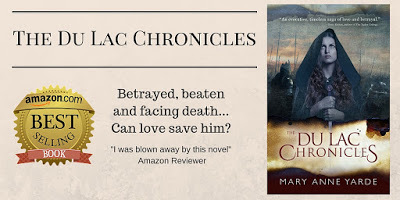
Book Extract
Annis raised her head reluctantly. She had never met King Oeric, although she had heard a lot about him, mainly about his skill as a warrior from her brother, who liked to talk about worthy opponents to anyone who cared to listen. His appearance surprised her. Oeric was an old man, older than her father was. His hair was a soft white, his face wrinkled. His eyes were watery and the colour of a foggy blue sky. His clothes were lavish and skilfully embroidered. He smiled a welcome, showing gaps in his mouth where his teeth had been knocked out. Alden was right; she could see he was mentally undressing her with his eyes. He made her feel sick.
“What is your name, my dear?” Even the way he spoke to her was lewd.
“Annis.”
“Annis?” Oeric raised his bushy white eyebrows. “A pretty name for a pretty girl.” He licked his lips. “And what are you doing in the company of Lord du Lac?”
Alden had to stop himself from saying king. The slight on Oeric’s part hit its mark well.
Annis nervously glanced at Alden. “I am his wife,” she whispered, fearing the lie.
“His wife?” he whispered back and then he laughed, turning his attention away from her and back to Alden.
“You lose a kingdom, but have the time to find a wife. Where did you pick her up? The dungeons?” Those gathered in the hall laughed at their king’s jest. “What did you do, my dear? Was it something horrid?” he asked Annis, stepping closer to her.
Alden’s arm shot out and pulled her closer to him. “The where and why has nothing to do with you.” There was a warning in his tone that he meant for Oeric to hear.
“You speak to me like a King. You forget yourself,” Oeric said, his eyes blazing with anger. “You cannot speak to me as an equal anymore. Annis, Annis.” He rolled her name over his tongue. “Of Wessex?” he stated, his eyes widening. “You married his daugher?"
Where can I purchase The Du Lac Chronicles?
Amazon US
Amazon UK
About the author
 Born in Bath, England, Mary Anne Yarde grew up in the southwest of England, surrounded and influenced by centuries of history and mythology. Glastonbury--the fabled Isle of Avalon--was a mere fifteen-minute drive from her home, and tales of King Arthur and his knights were part of her childhood.
Born in Bath, England, Mary Anne Yarde grew up in the southwest of England, surrounded and influenced by centuries of history and mythology. Glastonbury--the fabled Isle of Avalon--was a mere fifteen-minute drive from her home, and tales of King Arthur and his knights were part of her childhood.At nineteen, Yarde married her childhood sweetheart and began a bachelor of arts in history at Cardiff University, only to have her studies interrupted by the arrival of her first child. She would later return to higher education, studying equine science at Warwickshire College. Horses and history remain two of her major passions.
Yarde keeps busy raising four children and helping run a successful family business. She has many skills but has never mastered cooking--so if you ever drop by, she (and her family) would appreciate some tasty treats or a meal out! Useful Link Mary's Bookcase Myths, Legends, Books and Coffee Pots Goodreads Facebook
Published on May 14, 2016 06:06
May 11, 2016
Authors Inspirations - Jean Gill 'Thou shalt be, like, totally awesome' @writerjeangill
It is with the greatest of pleasure that I welcome Jean Gill back onto the blog again. Jean write the most beautiful historical fiction set in the France following the Second Crusade. I reviewed one of her novels, Song at Dawn, earlier on in the year and I absolutely loved it. You can read the review of Songs at Dawn....here!
Let's take a quick look at Jean's fabulous series.

From Book 1: 'Believable, page-turning and memorable.' Lela Michael, S.P. Review
Winner of the Global Ebook Award for Best Historical Fiction
1150: Provence
On the run from abuse, Estela wakes in a ditch with only her lute, her amazing voice, and a dagger hidden in her underskirt. Her talent finds a patron in Aliénor of Aquitaine and more than a music tutor in the Queen's finest troubadour and Commander of the Guard, Dragonetz los Pros.
Weary of war, Dragonetz uses Jewish money and Moorish expertise to build that most modern of inventions, a papermill, arousing the wrath of the Church. Their enemies gather, ready to light the political and religious powder-keg of medieval Narbonne.
Set in the period following the Second Crusade, Jean Gill's spellbinding romantic thrillers evoke medieval France with breathtaking accuracy. The characters leap off the page and include amazing women like Eleanor of Aquitaine and Ermengarda of Narbonne, who shaped history in battles and in bedchambers.
***
I now hand the blog over to Jean. Jean is going to tell us about the challenges a historical fiction writer often faces.
Thou shalt be, like, totally awesome
All writers of historical fiction have to watch our language. How far should we go into ‘olde worlde’ speech? What do readers want from us? What are our options?
When I wrote ‘Song at Dawn’, set in 1150, I knew I wanted to bring the 12th century to life: to tell the story of people whose motives and passions we could understand, within the context of real history. I suspect most writers of historical fiction share this aim but we all choose different ways of capturing the spirit of the past.
We all know that thee and thou, shouldst and wilt are older forms of you, should and will so one option is to use these words. However, they are not just interchangeable words; they have a grammatical place. Thou is the subject and thee is the object so I love thou is wrong. I lovest thee is still wrong as lovest is 3rd person (he/she/it lovest) so is the wrong form of the verb to go with I.
To any reader who has read literature of the past, wrong uses of thee and thou make a book unreadable so I think anybody who chooses these archaic forms should have excellent understanding of their use, as is shown by this famous novelist, writing a 12th century story.
‘Gurth,’ said the Jester, ‘I know thou thinkest me a fool, or thou wouldst not be so rash in putting thy head into my mouth. One word to Reginald Front-de-Boeuf, or Philip de Malvoisin, that thou hast spoken treason against the Norman,—and thou art but a cast-away swineherd,—thou wouldst waver on one of these trees as a terror to all evil speakers against dignities.’
‘Dog, thou wouldst not betray me,’ said Gurth, ‘after having led me on to speak so much at disadvantage?’
‘Betray thee!’ answered the Jester; ‘no, that were the trick of a wise man; a fool cannot half so well help himself—but soft, whom have we here?’ he said, listening to the trampling of several horses which became then audible.*
 Classic medieval historical fiction! Except that it’s written in 1820, using a style that’s a mish-mash of Shakespearean language and 19th grammatical structure, and bears no relationship to actual medieval speech.
Classic medieval historical fiction! Except that it’s written in 1820, using a style that’s a mish-mash of Shakespearean language and 19th grammatical structure, and bears no relationship to actual medieval speech.Actual medieval speech was probably closer to that in the miracle plays, still performed in York where I was lucky enough to spend my teenage years and university studies. If, as I have, you’ve watched the cycle of plays then you can’t help noticing the lively interplay between minor characters. The marital bickering (and physical abuse) between Noah and his wife is a classic example of medieval historical fiction; bringing history – in this case the bible stories - to life. Noah is warning his wife of the flood and she has had enough of his prophesies of doom and gloom.
Noah Wee! Hold thy tong, ram-skyt,
or I shall thee still.
Noah’s wife By my thrift, if thou smite
I shal turne the untill.
We shall assay as tyte!
Have at thee, Gill!
Upon the bone shal it bite. Noah A, so, Mary! thou smytis ill!
Bot I suppose
I shal not in thy det,
Flyt of this flett!
Take thee ther a langett
To tie up thy hose!
Rough translation
Noah Oof! Hold your tongue, ram-shit Or I’ll make it silent.
Noah’s wife By my virtue, if you hit me, I’ll face you out We’ll go to it right now! Take that, Gill! May it cut to the bone!
Noah Ouch, Mary! That hurts! But don’t think I’ll leave this placeTill I’ve paid you back!
Medieval English, even when composed in rhyme, tends to be direct and often vulgar – nothing like the 19th century romanticised version. This is particularly true of 12th century troubadour verse, the heart of my novels. I didn’t want wimpish minstrels and soppy romance; my hero, Dragonetz, is a warrior and troubadour, and Estela is his equal in a time and place where women had far more power than Victorian historians wanted us to know about.
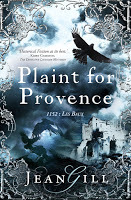 I can’t write in medieval English and be understood so I think ‘authenticity’ depends on suspension of disbelief in the reader. If a reader is caught up in my story and characters, and believes he/she is in the 12th century, then I have succeeded. What I have to avoid is anything that jars, that sounds too modern. In my first version, I used the words awesome and gay in their old senses. The modern meanings are too strong and jarred with my editor so out they came.
I can’t write in medieval English and be understood so I think ‘authenticity’ depends on suspension of disbelief in the reader. If a reader is caught up in my story and characters, and believes he/she is in the 12th century, then I have succeeded. What I have to avoid is anything that jars, that sounds too modern. In my first version, I used the words awesome and gay in their old senses. The modern meanings are too strong and jarred with my editor so out they came.One current convention among historical novelists is that you shouldn’t use contractions – or rather ‘You should not use contractions’. I do not mind whether writers keep to this or whether they don’t. Medieval speech used contractions. Thou’llt is a contraction from thou shalt or thou wilt; an in an thou is a contraction of and so there is no logical basis for advising a historical novelist to use no contractions – it’s a fashion and a writer’s choice.
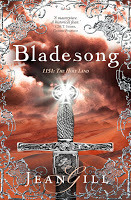 In The Troubadours Quartet I am representing a time (1150-1155), certain places (from Provence to the Holy Land) and a variety of languages, none of them ‘English’; Provencal, Arabic, Frankish, Latin, Hebrew among others. I want to give a flavour of the period and the people. I want readers to live the stories, as I do, and I hope my style helps bring history to life.
In The Troubadours Quartet I am representing a time (1150-1155), certain places (from Provence to the Holy Land) and a variety of languages, none of them ‘English’; Provencal, Arabic, Frankish, Latin, Hebrew among others. I want to give a flavour of the period and the people. I want readers to live the stories, as I do, and I hope my style helps bring history to life.At the beginning of Song at Dawn Aliénor (Eleanor) of Aquitaine is riding from Carcassonne to Narbonne, talking to her Commander of the Guard, my fictional hero Dragonetz. Their natural language would be Provencal, what we now call Occitan. I do use some Occitan words (and from other languages) to add flavour but the novels are in the form of English I feel suits them best. My readers must be the judge!
She rallied. ‘Wouldn’t you love to deal with monsters, dragons and ogres instead of Toulouse and his wet-nurses?’ Her smile clouded over again. ‘Or the Frankish vultures, flapping their Christian piety over me. Do you know how Paris seems to me? Black, white and grey, the northern skies, the drab clothes, the drab minds. All the colour is being leeched out of my life, month by month and I cannot continue like this.’
‘You must, my Lady. It is your birthright and your birth curse. You know this.’
*Extract from Ivanhoe by sir Walter Scott
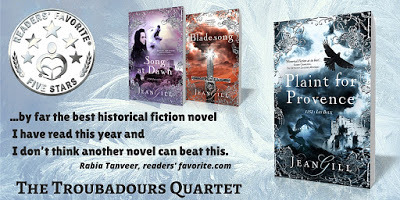
Thank you so much Jean, for such a fascinating post.Now I am sure you are all wanting to know...
Where can I buy this fabulous Quartet? Amazon
About the author
 Jean Gill is a Welsh writer and photographer living in the south of France with a big white dog, a scruffy black dog, a Nikon D700 and a man. For many years, she taught English in Wales and was the first woman to be a secondary headteacher in Carmarthenshire. She is mother or stepmother to five children so life was hectic.
Jean Gill is a Welsh writer and photographer living in the south of France with a big white dog, a scruffy black dog, a Nikon D700 and a man. For many years, she taught English in Wales and was the first woman to be a secondary headteacher in Carmarthenshire. She is mother or stepmother to five children so life was hectic.Publications are varied, including prize-winning poetry and novels, military history, translated books on dog training, and a cookery book on goat cheese. With Scottish parents, an English birthplace and French residence, she can usually support the winning team on most sporting occasions.
Contact Jean at jean.gill@wanadoo.fr with comments or questions. You'll find a mix of her work, along with fun trivia about books, at www.jeangill.com Her photo portfolio is at www.istockphoto.com/jeangill and she blogs at www.jeangill.blogspot.com
Published on May 11, 2016 06:55
Book Review - The Hidden Oracle (The Trials of Apollo Book 1) @camphalfblood
'I couldn't recall the last time someone had care about me enough to curse my enemies with rhyming couplets.'
Way back in 2005, I was in the children’s section at Waterstones, looking for a book that had a Roman or Greek theme to it. My eldest loved everything to do with ancient history – and, incidentally, still does. One book caught my eye. It had on the front cover these words…
Half Boy
Half God
All Hero
I picked the book up, took a quick look at the back cover, liked what I saw, and bought it. And so began my family’s love affair with The Percy Jackson series by Rick Riordan. We have all the books, including The Heroes of Olympus series. So when I was offered the chance of reviewing the ARC of Rick Riordan’s latest book, you can imagine my response.
Let's take a quick look at the book...
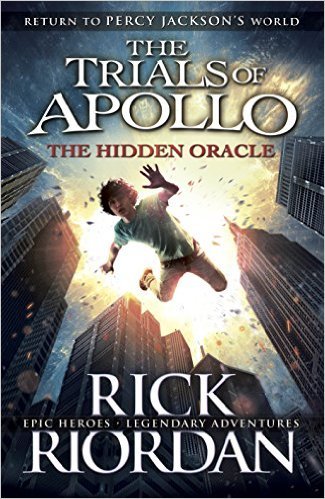
What did I think of the book?
There are some truly gifted children’s authors out there, and then there is Rick Riordan, who, in my opinion, is in a class of his own.
I adored the Percy Jackson series and I loved The Trials of Apollo. It is classic Riordan -- fast paced, laugh-out-loud funny, with really likable characters and horrible evil immortals who want to rule the world. Apollo’s struggle to adapt to being mortal was incredibly well crafted, and it was great to go home to Camp Half-Blood, as well as meeting up with old friends such as Percy and Chiron.
I loved the idea of Apollo losing his godly powers and having to face life as a mortal. He really struggles to adapt to being just a regular teenager, sometimes with hilarious consequences. And despite coming across, for most of the book, as a narcissist, he was in fact a really likable character and I look forward to reading about his trials in the following books.
Despite the mythological world Riordan's books are set in, he does address some other ‘mortal’ issues with a delicate skill that should be commended. I think his books are fantastic for teaching tolerance. We are all human and we shouldn’t be judged - or judge - because of what we look like, whom we love, or where we come from. With this in mind, it is worthy to note that unlike the Percy Jackson series, this book seems to be targeted at a slightly older audience - it read as more of a Young Adult novel.
If you are looking for a fun mythological read, either for yourself (because I'm a grown-up and I loved it) or for your older children - teens - then look no further than the books by Rick Riordan.
I Highly Recommend.
Where can I purchase this fabulous book?AmazonUSAmazon UKAnd all good bookshops!
About the author
 Rick Riordan is the author of the #1 New York Times bestselling Percy Jackson and the Olympians series for children and the multi-award-winning Tres Navarre mystery series for adults.
Rick Riordan is the author of the #1 New York Times bestselling Percy Jackson and the Olympians series for children and the multi-award-winning Tres Navarre mystery series for adults.For fifteen years, Rick taught English and history at public and private middle schools in the San Francisco Bay Area and in Texas. In 2002, Saint Mary's Hall honored him with the school's first Master Teacher Award.
His adult fiction has won the top three national awards in the mystery genre -- the Edgar, the Anthony and the Shamus. His short fiction has appeared in Mary Higgins Clark Mystery Magazine and Ellery Queen's Mystery Magazine.
His Percy Jackson series features a twelve-year-old dyslexic boy who discovers he is the modern-day son of a Greek god. The Lightning Thief was a New York Times Notable Book for 2005. Film rights have been purchased by Twentieth Century Fox and a feature film is in development. The Sea of Monsters was a Child Magazine Best Book for Children for 2006 and a Publishers Weekly and BookSense national bestseller. The third title, The Titan's Curse, made the series a #1 New York Times bestseller, and the fourth title, The Battle of the Labyrinth, had a first printing of one million copies. Rick is also the author of The 39 Clues: The Maze of Bones, another #1 New York Times bestseller. Film rights for The 39 Clues have been purchased by Steven Spielberg and DreamWorks.
Rick Riordan now writes full-time. He lives in San Antonio with his wife and two sons. Useful LinksWebsite.
Published on May 11, 2016 05:45
May 10, 2016
Blog Tour - Argos @chapterxchapter @PhillipWSimpson @month9books

Happy Release Day toArgos by Phillip W. SimpsonJoin us in celebrating this new release from Month9Books!Enter the giveaway found at the end of the post.Happy Book Birthday, Phillip!
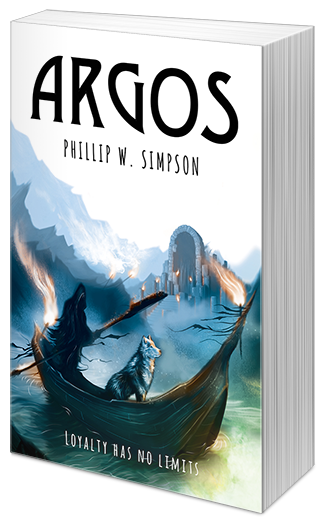
Loyalty has no limitsRaised from a pup by Greek hero, Odysseus, Argos has come to learn the true meaning of love and loyalty. But when Odysseus leaves for the Trojan War, little does Argos know it will be 20years before he sees his master again. With Odysseus gone his wife, Penelope, and son, Telemachus, are easy prey for neighboring kings and the Gods themselves.But Argos was tasked to keep them safe until Odysseus returns and that is a promise he isdetermined to keep – whatever the cost. Told through his eyes, Argos recounts the story of hislife – his pain, his joy, his triumphs and failures; his endurance in the face of hardships almost too great to believe.Above all else, Argos strives to do what is right – and to remain loyal to his King when all others have given up hope. To live long enough to see his beloved master one more time.This epic myth of love and loyalty proves that a dog really is man's best friend.
 Argos by Phillip W. Simpson Release Date: May 10, 2016 Publisher: Month9Books
Argos by Phillip W. Simpson Release Date: May 10, 2016 Publisher: Month9Books Amazon | B&N | TBD | Chapters | BAM


Phillip W. Simpson has written over 50 children’s books for both middle grade and young adult readers. He has a background in Ancient History and Archaeology, and has partially completed his doctorate in Archaeology. He lives in Auckland, New Zealand, with his wife Rose, their son, Jack and their two border terriers, Whiskey and Raffles. When not writing, he works as an elementary school teacher.Website | Twitter | Facebook | Tumblr | Pinterest |Goodreads
 Complete the Rafflecopter below for a chance to win!
Complete the Rafflecopter below for a chance to win! a Rafflecopter giveaway

Published on May 10, 2016 00:00
May 8, 2016
The Land of King Arthur - Dozmary Pool
A slender arm that gripped a swordrose slowly from the water."I'll save her" cried young Arthur."She must be some knight's daugter...""Be still," hissed Merlin. "There you seethe Lady of the Lake.She's like a kind of mermaid.That sword is yours to take."
Excalibur the Magic Sword- Crazy Camelot Capers Tony Mitton and Arthur Robins
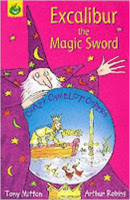 My children loved the stories from Crazy Camelot when they were little. There is nothing like children stories in rhyme and the illustrations that are inside the book are fabulous. If you have young children and you want to introduce them to King Arthur and his knights then this is a fun way to do it.
My children loved the stories from Crazy Camelot when they were little. There is nothing like children stories in rhyme and the illustrations that are inside the book are fabulous. If you have young children and you want to introduce them to King Arthur and his knights then this is a fun way to do it.Before I take the rest of this post to praise Crazy Camelot, I actually wanted to talk about a very famous lake in Arthurian legend.
There are two stories as to how Arthur came by his magical sword. Both will be familiar I am sure. The first one claims that Arthur pulled a sword from a stone. The other states that the sword was gifted to Arthur by the Lady of the Lake.
But where is the Lake?
Could Dozmary Pool be the lake in question??!

Dozmary Pool can be found in Cornwall, in the parish of Altarnun on Bodmin Moor. It is a Site of Special Scientific Interest and is within the Cornwall Area of Outstanding Natural Beauty - I can understand why. And from the picture above, it is easy to imagine a sword rising from the water.
Now, Excalibur came with instructions - not quite a 'how to use' manual - I am sure Arthur knew how to handle a sword. The instructions were simple. I shall quote from Crazy Camelot again, so prepare yourself for some more rhyme...
I am Excalibur, your sword,and I will never break.But when your reign is over,return me to the lake.
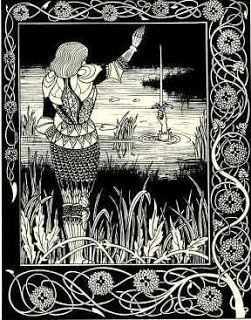 The general consensuses is that Arthur was mortally wounded at the Battle of Camlann. Arthur recalled the instructions about the sword. He had to get back to the lake. Sir Bedivere, the only surviving knight of The Round Table - took Arthur back to the lake, but Arthur was too weak to throw the sword back into the lake, so he instructs Sir Bedivere to do it for him. But Sir Bedivere could not bring himself to throw such a beautiful sword into the water, so he hid it and returned to Arthur. Arthur asked him if he had thrown the sword back in the lake. Sir Bedivere lied and said he had. Arthur could see through the lies and told Sir Bedivere to do as he instructed. But Sir Bedivere just could not do it. He lied to Arthur for the second time. Once again, Arthur could see through the lies and for the last time told Sir Bedivere to do as he was instructed. Against his better instincts, Sir Bedivere threw the sword into the lake. To his very great surprise, a hand reached up from the water and grabbed the sword, drawing it back down into the watery depths, out of sight forever more. Sir Bedivere returned to Arthur and told him what he had seen. This time, Arthur believed him.
The general consensuses is that Arthur was mortally wounded at the Battle of Camlann. Arthur recalled the instructions about the sword. He had to get back to the lake. Sir Bedivere, the only surviving knight of The Round Table - took Arthur back to the lake, but Arthur was too weak to throw the sword back into the lake, so he instructs Sir Bedivere to do it for him. But Sir Bedivere could not bring himself to throw such a beautiful sword into the water, so he hid it and returned to Arthur. Arthur asked him if he had thrown the sword back in the lake. Sir Bedivere lied and said he had. Arthur could see through the lies and told Sir Bedivere to do as he instructed. But Sir Bedivere just could not do it. He lied to Arthur for the second time. Once again, Arthur could see through the lies and for the last time told Sir Bedivere to do as he was instructed. Against his better instincts, Sir Bedivere threw the sword into the lake. To his very great surprise, a hand reached up from the water and grabbed the sword, drawing it back down into the watery depths, out of sight forever more. Sir Bedivere returned to Arthur and told him what he had seen. This time, Arthur believed him.Dozmary Pool is bottomless and has a secret tunnel that leads directly to the ocean - a perfect home for the Lady of the Lake. Back to the question is Dozmary Pool - that lake?
It is certainly atmospheric enough, but...
It isn't bottomless - in 1869 the pool dried up and apart from finding some amazing Neolithic arrowheads, there was no tunnel - so there goes that theory.
It is also argued that Dozmary Pool is too far away from the proposed site of the Battle of Camlann.
So the bottom line is that it is very unlikely that Dozmary Pool is that lake - but it is stunning.
Published on May 08, 2016 00:00
May 6, 2016
Friday Knights - The Fisher King and Arthurian Legend
"[he]....was wounded in a battle and completely crippled, so that he's helpless now, for he was struck by a javelin through both his thighs; and he still suffers from it so much that he can't mount a horse. But when he wants to engage in some pleasure and sport he has himself placed in a boat and goes fishing with a hook" Chrétien de Troyes, Perceval
Ouch! I am not surprised The Fisher King could not mount a horse with this injury. However, there is more to The Fisher King than a fishing boat and an awful war wound.
The 12th Century, French poet, Chrétien de Troyes, was the first to introduce The Fisher King to the Arthurian Legend, in his great work Percival. It is suggested that de Troyes was influenced by an earlier Celtic story about Brân the Blessed. There are similarities between the two characters. Bran is injured in the foot - The Fisher King is injured in the leg. Bran has a magic cauldron that can restore life - The Fisher King is the keeper of the Holy Grail, a magical cup that can sustain life.
 Back to the story...unfortunately, The Fisher King, thanks to his injury, can not sire a child - his kingdom reflects his injury, it becomes a waste land....barren.
Back to the story...unfortunately, The Fisher King, thanks to his injury, can not sire a child - his kingdom reflects his injury, it becomes a waste land....barren.But, there is hope for the Fisher King - he is not destined to spend the rest of his days fishing. One day a knight will heal him - it has been foretold.
Percival stumbles upon an old man fishing and, being a nice sort of chap, he strikes up a conversation with the elderly man. The fisherman directs Percival to a beautiful castle. To his surprise, Percival is welcomes by the fisherman - The Fisher King. The Fisher King is the most hospitable host. He presents Percival with a sword and he announces that a huge feast is to be held in Percival’s honour.
 Now, Percival has spent his entire life in the woods - his mother having shunned the world after the death of Percival’s father. Percival has never been to a feast before and he is on his best behaviour. His mother has installed in him good manners, so when he is shown a candelabrum, a bleeding lance and a grail, he bites his tongue to stop asking any questions about these mysterious set of objects.
Now, Percival has spent his entire life in the woods - his mother having shunned the world after the death of Percival’s father. Percival has never been to a feast before and he is on his best behaviour. His mother has installed in him good manners, so when he is shown a candelabrum, a bleeding lance and a grail, he bites his tongue to stop asking any questions about these mysterious set of objects.Of course, in a bitter twist of irony, the Fisher King’s only hope of being healed was for Percival to ask him questions about these objects. One can only imagine what The Fisher King must have been thinking!
 The feast comes to an end and Percival toddles off to bed. But where he awakes in the morning, he finds the castle in ruins and he is alone.
The feast comes to an end and Percival toddles off to bed. But where he awakes in the morning, he finds the castle in ruins and he is alone.Unfortunately for us, Chrétien de Troyes died before he could complete his great work.
Some forty years later, Wolfram von Eschenbach takes up the story in his work, Parzival. This story keeps to the original, with a few subtle differences. Firstly, he gives The Fisher King a name - Anfortas. We learn how The Fisher King received his wound - he is a Grail Keeper and therefore is not allowed a wife, but he marries her anyway and this is his punishment - intolerable pain. Percival rights the wrong and later cures The Fisher King.
Around the end of the 13th Century, Robert de Boron, continued The Fisher Kings story. The Fisher King - who now goes by the name of Bron - is the brother-in-law of Joseph of Arimathea. Joseph entrusts the sacred Grail to Bron. Bron becomes the first Grail Keeper - eventually the title of keeper of the Grail is passed on to Percival.
And then things really become complicated...!
In Lancelot-Grail, there are two Fisher kings - or should I say one wounded king called Pellam and a Fisher King called Pelles. It is Pelles who tricks Lancelot into begetting a child with Elaine - there is a prophesy that states Galahad will retrieve the Grail and heal the land.
Not to be outdone, Malory, has four possible Fisher Kings in his famous story, Le Morte d'Arthur.
1. King Pellam2. King Pelles3. King Pescheour - Lord of the Grail Castle4. A bed ridden nameless king who Galahad heals.
Of course with the passage of time the story has been retold until, it became just another part of the story...a part of the legend.
Meeting the King - Merlin
So there we have it, a brief outline of The Fisher King.
Published on May 06, 2016 00:00
May 5, 2016
Book Review - The Master And The Maid @LauraLibricz
“Listen to me! You see this child? If they find the child they will kill her. If they find me with this child, they will kill me to. They’ve already killed her mother. Syball saw them do it. But they won’t kill you. I’ll see to it. But you must swear to care for the child as your own. Never tell a soul where she came from or I will slit your throat.”
I was privileged to receive an ARC of The Master and the Maid by historical fiction author, Laura Libricz. Before I talk about my feelings for the book, lets have a closer look at the story.
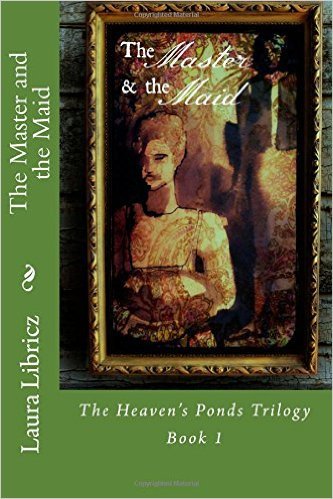
She's lost her work, her home and her freedom. Now, harboring a mysterious newborn, she could lose her life.
In 17th Century Germany on the brink of the Thirty Years War, 24-year-old Katarina is traded to the patrician Sebald Tucher by her fiancé Willi Prutt in order to pay his debts. Forced to move into the Tucher country estate, Katarina is met by a crazed archer, Hans-Wolfgang, carrying a baby under his cloak. He tells her a confused story of how his beloved was executed by a Jesuit priest for witchcraft right after the birth and makes Katarina swear on her life to protect the child. She could fall in disfavor with her master. She could be hunted by the zealots who killed his beloved. Can Katarina's love for the baby and Sebald Tucher's growing desire for her keep the wrath of the zealots at bay?
Set in Franconia, The Master and the Maid is an accurate, authentic account of a young woman's life in Germany in the 1600's, illustrating her struggle for freedom and her fight for those she loves.
What did I think of the book?
Historical Fiction at its best.
Was ever there a story more captivating and charming than The Maid and the Master? The attention to detail was exquisite - I felt like I had travelled back in time to 1616. The story telling was spellbinding to say the least. Once I started reading this book, I could not put it down.
The protagonist of the story, Katarina, is a young woman who has foolishly given her heart to the wrong person. Her situation is precarious – she is a fallen woman, living with a man whom she is not married to, but she is honest and ever hopeful that one-day fate will deal her a better hand. But alas, her beloved “trades” her to pay off a debt to his landlord and Katarina finds herself at the mercy of her new master, Herr Tucher. I thought Katarina was beautifully portrayed. She was totally believable and I really came to care about. Through her, Libricz depicted how hard it was for a woman in a time of religious unrest.
Ralf, a career obsessed priest, will stop at nothing to open his Jesuit school. He will even go as far as to commit murder to achieve his aims. Ralf really made my skin crawl – he was cruel, devious, manipulative and vicious. Libric painted a very dark picture of this evil man. He was the perfect antagonist. I really began to fear what this horrid man was going to do next.
I would really like to commend Libricz on such a masterpiece. This book really ticked all of the boxes for me - Fleshed characters, fantastic plot and the most beautiful prose. I cannot wait for the rest of the trilogy. I Highly Recommend this book.
Where Can I purchase this fabulous book? Amazon USAmazon UK
About the author
 Laura Libricz was born and raised in Bethlehem PA and moved to Upstate New York when she was 22. After working a few years building Steinberger guitars, she received a scholarship to go to college. She tried to 'do the right thing' and study something useful, but spent all her time reading German literature.
Laura Libricz was born and raised in Bethlehem PA and moved to Upstate New York when she was 22. After working a few years building Steinberger guitars, she received a scholarship to go to college. She tried to 'do the right thing' and study something useful, but spent all her time reading German literature. She earned a BA in German at The College of New Paltz, NY in 1991 and moved to Germany, where she resides today. When she isn't writing she can be found sifting through city archives, picking through castle ruins or aiding the steady flood of Höfner musical instruments into the world market.
Her first novel, The Master and the Maid, is the first book of the Heaven's Pond Trilogy. The Soldier's Return and Ash and Rubble are the second and third books in the series.Useful LinksWebsite
Published on May 05, 2016 04:23
The Coffee Pot Book Club
The Coffee Pot Book Club (formally Myths, Legends, Books, and Coffee Pots) was founded in 2015. Our goal was to create a platform that would help Historical Fiction, Historical Romance and Historical
The Coffee Pot Book Club (formally Myths, Legends, Books, and Coffee Pots) was founded in 2015. Our goal was to create a platform that would help Historical Fiction, Historical Romance and Historical Fantasy authors promote their books and find that sometimes elusive audience. The Coffee Pot Book Club soon became the place for readers to meet new authors (both traditionally published and independently) and discover their fabulous books.
...more
...more
- Mary Anne Yarde's profile
- 159 followers



